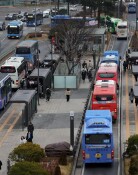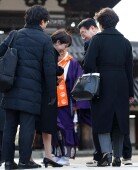[Editorial] Backward Labor Activities Dampening Economic Growth
[Editorial] Backward Labor Activities Dampening Economic Growth
Posted August. 29, 2005 03:07,
Leaders of the Federation of Korea Trade Unions and the Korean Confederation of Trade Unions recently insisted that what was really embarrassing was not their boycott, but backward labor policies which do not meet international standards. They passed the buck to the government even when the International Labor Organization`s Asian Regional Meeting in Busan in October was virtually cancelled because of the two umbrella unions boycott. However, they remained silent on whether labor activities such as employment and rebate scandals, frequent strikes and extreme political strife of labor unions complied with international standards or not.
Outdated labor activities of the two biggest umbrella unions and some vested interests of labor unions have aggravated the problems of the national economy and increased the burden on the shoulders of the people. The Korean economy has weakened to the extent that its advance to the ranks of the advanced economies cannot be guaranteed.
According to the Korean Bank, the potential growth rate of the economy has sharply fallen from 6.1 percent between 1991 and 2000 to 4.8 percent between 2001 and 2004, and is expected to further decrease to around 4.6 percent between 2005 and 2014. This sharp fall is largely due to the shrinking investment and slowing labor supply amid fierce global competition.
The responsibility for the plunging potential growth rate falls on every party of government, business, and household. The two biggest umbrella unions and some vested interests of labor unions, which should bear the largest share of the responsibility, seem to consider the current situation as none of my business. After a series of corruption scandals, they promised reflection, but continued political strife such as their withdrawal from the Korea Tripartite Commission, their demand for the resignation of the labor minister, and their general strike.
There is no good that can come from the labor unions response to the governments emergency adjustment to end a strike by unionized pilots at Asiana Airlines who get hundreds of millions of won in annual salary. When national credibility falters, business is dealt a blow. In turn, interests of workers are undermined, too.
The Korean Bank analyzed that the potential growth rate could increase to 5.2 percent or plummet to 3.0 percent depending on the response from the public and private sectors. What is most urgent in improving the potential growth rate through expanded investment and employment is for labor unions of large corporations to make concessions in terms of pay and employment, and help to create a more flexible labor market. That is the challenge of the two umbrella unions. The two unions should show advanced labor activities by returning to the Tripartite Commission and addressing urgent issues such as a bill on irregular workers and a response to the industrial hollowing-out in an effort to compensate for loss of national interests caused by the cancellation of the ILO meeting.







